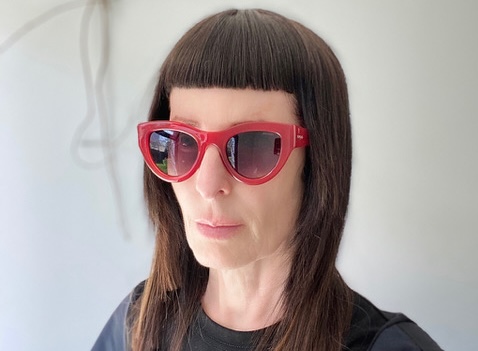
Courtesy of Tammy McNary

Audio By Carbonatix
The concept of death occupies a complicated place in American minds, especially when compared with other societies. In Ghana, the dead are honored with elaborately carved coffins representing the essence of the deceased. In Indonesia, mummified ancestors are exhumed every three years for a ceremonial refresh and celebration. And in Mexico, the departed are celebrated during each year’s Día de Los Muertos holiday with pageants and rituals.
Compare that with the institutional and often sterile way we deal with death in the U.S., and one might find something is lost in the process. This is why individuals such as artist-turned “death doula” Tammy McNary are trying to flip the script by demystifying death through conversation and community.
With her 1-year-old Big D Roaming Death Café, McNary aims to alleviate the fear of the unknown by hosting monthly, free-to-all discussions on all aspects of death, dying and the in-between.
“Death wasn’t hidden in my family,” McNary explains of her attraction to the subject. “My parents talked about it openly and freely. For as long as I can remember, I grew up understanding death is a part of life, not something to fear, but something to meet with presence. Still, when we experience personal loss, I’ve felt how disorienting it can be to live in the fog of grief and uncertainty, so I saw how much it matters to have somebody by your side to validate your feelings.”
The Detroit native already had experience dealing with big emotions throughout a 20-year career teaching elementary school kids art. When she heard of the concept of a death doula, she knew she wanted to implement her skill set in an alternative way. Training with the International End-of-Life Doula Association (Inelda), the most prominent organization of its kind in the world, she fell in love with the work.
Launching the True Death Experience in 2022, McNary has since provided clients with holistic support, end-of-life planning and counseling. Death doula may be her day job, yet McNary felt an even larger calling to share what she has learned with a broad audience, particularly during a time when many have difficulty dealing with the emotions a death can spark.
“I think we have conditioned people to not talk about death enough in our culture and our society,” she says. “In the last 150 years, since the Civil War, we’ve taken the body away from the families, and in the last 50 years, everyone dies in a hospital. We’ve made everything very sterile, and we don’t let people sit with the dead. I thought a death café would be a really interesting and beautiful way to get people together and express their feelings and thoughts around death in as supportive a setting.”
Death Cafes have grown in popularity since their inception in England in 2011 by John Underwood. Launching her local chapter in January 2024 at the Hampton-Illinois Branch Library in Dallas, McNary leads a monthly group in a free chat through topics that run the gamut from fear of death and dying to green burials (a new trend in the death world in which bodies are placed in the ground without chemicals in a shroud or biodegradable coffin). The laws governing what is permitted in funerals and burials by the government also come into play. Most participants don’t know a family is entitled to bring their own casket or transport a deceased loved one within the state. With such a wide-ranging array of subjects, each salon-style café becomes a unique experience in its own right.
“We just bounce things off each other,” McNary says. “There’s all sorts of odd things that come up and very sorrowful things, and there is also a lot of laughter, which is unexpected. People have been surprised at how comforting it is to talk about death in a group of strangers.”
Typically held on the second Thursday of the month, October’s Big D Death Café is special, as it will occur in the “meditative” environs of Oakland Cemetery, one of the most significant resting places in Dallas. Founded in 1892, its sprawling grounds blend ornate monuments and statuary with wildflowers and prairie grasses, making the experience both historically compelling and surprisingly zen.
“I think it’s a place where people can connect in a deeper way,” McNary says. “I think it really shifts the narrative of the Death Café, from a clinical narrative to something deeply human and connected to nature. To me, death is connected to the seasons. Not the season of Halloween, but when things start to go dormant, I like to think about when everything’s underground and invisible. We also make the comparison when we’re at the cemetery, that there’s death and yet all this life around us. For me, it’s a seasonal thing about the shifting cycles of life.”
Followed by a tour from cemetery administrator Monica Newbury, which may cover everything from graveyard symbolism to ongoing preservation efforts, the event is sure to be compelling, regardless of one’s level of comfort with the topic. For McNary, it’s just another way to share her thoughts on a formerly forbidden subject while helping to bond strangers from many different age groups and socioeconomic backgrounds, a feat she refines by also offering simple rituals such as lighting a candle or having a participant write in a diary to release feelings.
“Things like the death café are important, because it takes away some of the taboos,” McNary says. “It’s less scary when someone is able to talk about their fears. It’s a really powerful experience for me, and it just kind of makes me examine my life in a new way and feel a little bit lighter.”
A special free outdoor edition of Big D Roaming Death Cafe will be held at Oakland Cemetery, Saturday, Oct. 4, 10-11:30 a.m. followed by a tour by Monica Newbury, Oakland Cemetery’s administrator.